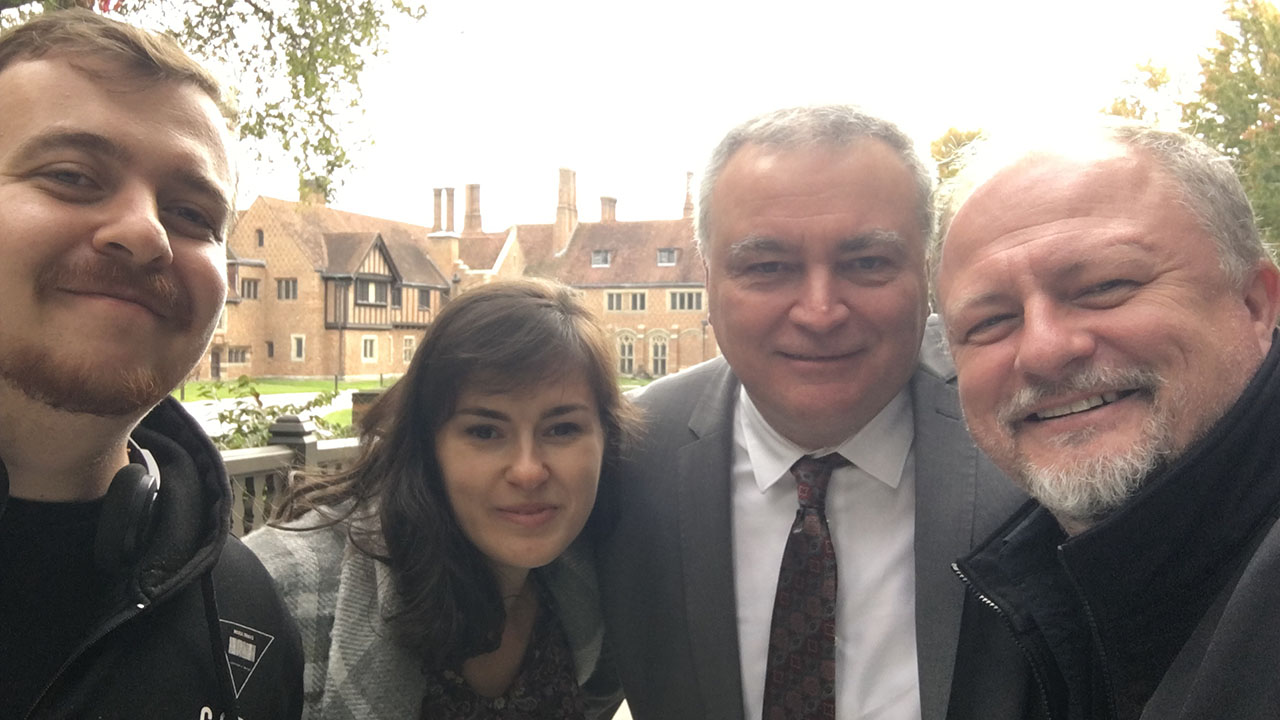Global collaborative led by OU shows ways to support Ukraine’s scientific community

In the wake of Russia’s unprovoked invasion of Ukraine, the global scientific community rallied to support Ukraine’s scientists, offering paid positions, education programs, funding programs and other assistance.
While these resources were sorely needed, most required Ukrainians to relocate to countries across Europe and North America. The question of how best to help scientists within Ukraine loomed as many researchers remained in the country unwilling or unable to leave.
“A lot of scientists couldn’t leave or didn’t want to leave,” said Taras Oleksyk, assistant professor in OU’s Department of Biological Sciences. “Some had families who couldn’t leave, some didn’t want to leave their labs and homes, some didn’t know if they’d be able to integrate into a foreign university, others had military obligations.” Martial law in Ukraine currently prohibits males 18 to 60 from leaving the country.
Oleksyk and his two OU graduate assistants, Walter Wofsberger and Khrystyna Shchubelka, analyzed the global scientific community’s response to the crisis in Ukraine and offered recommendations to better serve the needs of scientists who remain in the country.
Published in the journal GigaScience, their study analyzed programs advertised in #ScienceForUkraine, the largest database of research-related opportunities for Ukrainian scholars. The analysis showed that during the first 12 months of the war less than 3% of advertisements mentioned the word “remote,” with most requiring travel.
In light of this finding, the study brought together a group of 23 researchers across Europe and the U.S. who suggested pragmatic ways to increase engagement and support of scientists at their home labs, including establishing more remote research collaborations; donating funds and providing access to resources; sharing research opportunities; participating in online events inside the country; and enabling remote education and training opportunities, to name a few.
According to Oleksyk, the study emphasized data-driven research since it is one of the simplest ways researchers can collaborate remotely.
“Because of massive developments in computation, computer networks and connectivity in the world, data is something people can work with without leaving their desktop,” Oleksyk explained. “This provides new opportunities for remote collaboration because people in different parts of the world can simultaneously work on the same dataset, write a collaborative paper or design a project requiring researchers working together in multiple locations. It’s a rapidly accelerating trend that the global research community should be taking full advantage of.”
Oleksyk cited several examples collaborative, data-driven research, including an Oakland University-led study of genetic diversity in Ukraine (also published in GigaScience) that involved researchers around the world.
“We’ve already generated the genomic database for Ukraine, now we need scientists to analyze the data,” Oleksyk said. “The people who get involved in these types of projects will hopefully stay in science, instead of switching jobs just to survive.”
Keeping Ukraine’s scientists engaged in science has long-term implications for the country’s post-war recovery and advancement, Oleksyk added, particularly given the years of education and training required to gain competence in highly specialized fields.
“We’re talking 15 years of study beyond high school, and if you lose that generation, you’ll have to train the next generation, but you won’t have scientists to teach them. It creates a generational gap that would slow recovery for the entire country.”
Oleksyk, Wolfsberger and Shchubelka, who all hail from Ukraine, have supported the cause through fundraising, teaching online courses/workshops and working on a study of individuals with Type 1 diabetes in Ukraine funded by The Leona M. and Harry B. Helmsley Charitable Trust. Researchers are analyzing DNA samples to determine how rare and local genetic variants affect Type 1 diabetes risk, knowledge that may prove useful in combating Researchers are analyzing DNA samples to determine how rare and local genetic variants affect Type 1 diabetes risk, knowledge that may prove useful in combating the disease. Participants in the study receive free check-ups, free C-peptide tests (which measure the amount of insulin the body is producing) and free insulin treatments.
“We're in the process of collecting twenty thousand DNA samples, which are being analyzed here and in Ukraine,” said Oleksyk. “We’re providing research-based support and income remotely to several collaborators at Uzhhorod National University and about 60 doctors in more than a dozen cities across Ukraine using funds from our grant from the Helmsley Charitable Trust.”
Wolfsberger and Schubelka, who recently successfully defended their doctoral dissertations, will stay at OU as Helmsley postdoctoral fellows for the next year and continue their work on the project.
In addition, Oakland University and Uzhhorod National University in Ukraine have signed a Memorandum of Understanding to offer mutual assistance in the areas of research and education. The universities have partnered on research projects, virtual talks and workshops. When Ukraine’s power grid started getting bombed earlier this year, Oleksyk raised funds for a power generator and a battery to get the students and faculty of an entire department back online.
“We need to support Ukraine because their experience offers lessons that can help us deal with future challenges,” said Oleksyk “So when the next crisis hits, wherever that may be, we’ll be able to apply what we’ve learned and formulate solutions.”

 July 27, 2023
July 27, 2023







